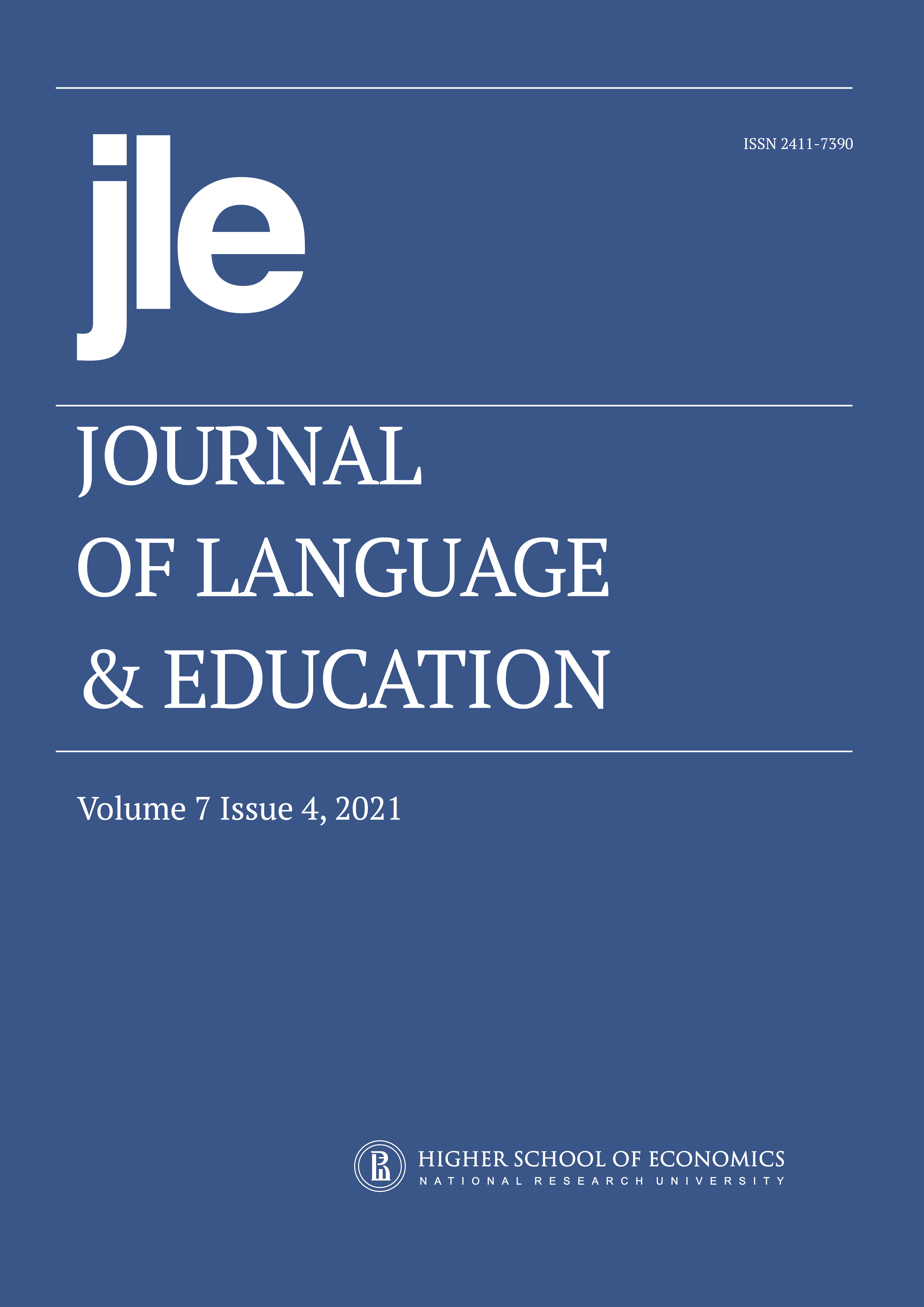Covid-19: Экспромт или определяющий фактор в исследованиях в сфере языка и образования?
Аннотация
В связи с огромным потоком исследований новой коронавирусной инфекции в 2020 и 2021 годах, чрезвычайная пандемическая ситуация ставит всему миру новые беспрецедентные задачи, в особенности сферам науки и образования. Редакторы журнала «Язык и образование» сосредоточились на первых итогах и трудностях, которые стали результатом исследовательской деятельности во время пандемии. Авторы посвящают свои исследования обучению в условиях ковидных ограничений, обращая особое внимание на высшее образование и преподавание второго языка; также рассматриваются ключевые тенденции в образовании как ответ на пробелы в области знаний. Доля внимания также уделяется растущим лингвистическим исследованиями и появлению новых слов, которые описывают ранее неизвестные явления. Редакторы подводят итог тех препятствий, которые возникли из-за срочности публикаций и ухудшения качества экспертной оценки, и предлагают некоторую оценку последствий лавины исследований Covid-19 для науки.
Скачивания
Литература
Abrar-ul-Hassan, S., Douglas, D., & Turner, J. (2021). Revisiting second language portfolio assessment in a new age. System, 103. DOI: https://doi.org/10.1016/j.system.2021.102652
Ahlburg, D.A. (2020). Covid-19 and UK Universities. The Political Quarterly, 91(3), 649-654. DOI: https://doi.org/10.1111/1467-923X.12867
Almusharraf, N. M., & Khahro, S. H. (2020). Students' satisfaction with online learning experiences during the Covid-19 pandemic. International Journal of Emerging Technologies in Learning, 15(21), 246-267. DOI: https://doi.org/10.3991/ijet.v15i21.15647
Al-Salman, S., & Haider, A. S. (2021). Covid-19 trending neologisms and word formation processes in English. Russian Journal of Linguistics, 25(1), 24-42. DOI: https://doi.org/10.22363/2687-0088-2021-25-1-24-42
Asif, M., Zhiyong, D., Iram, A., & Nisar, M. (2021). Linguistic analysis of neologism related to coronavirus (Covid-19). Social Sciences & Humanities Open, 4(1), 100201. DOI: https://doi.org/10.1016/j.ssaho.2021.100201
Bao, W. (2020). Covid-19 and online teaching in higher education: A case study of Peking University. Human Behavior and Emerging Technologies, 2, 113 - 115. DOI: https://doi.org/10.1002/hbe2.191
Charania, A., Bakshani, U., Paltiwale, S., Kaur, I., & Nasrin, N. (2021). Constructivist teaching and learning with technologies in the Covid-19 lockdown in eastern India. British Journal of Educational Technology, 52(4), 1478-1493. DOI: https://doi.org/10.1111/bjet.13111
Cheung, A. (2021). Language teaching during a pandemic: A case study of zoom use by a secondary ESL teacher in Hong Kong. RELC Journal. DOI: https://doi.org/10.1177/0033688220981784
Choi, L., & Chung, S. (2021). Navigating online language teaching in uncertain times: Challenges and strategies of EFL educators in creating a sustainable technology-mediated language learning environment. Sustainability, 13(14), 7664. DOI: https://doi.org/10.3390/su13147664
Cierpich-Kozieł, A. (2020). Corona reality - about new Polish compound words with the stem korona-in the time of pandemic. Jezyk Polski, 100(4), 102-117. DOI: https://doi.org/10.31286/JP.100.4.7
Gregersen, T., Mercer, S., & MacIntyre, P. D. (2021). Language teacher perspectives on stress and coping. Foreign Language Annals, 1-19. DOI: https://doi.org/10.1111/flan.12544
Haddad, A. H., & Montero-Martínez, S. (2020). Covid-19: A metaphor-based neologism and its translation into Arabic. Journal of Science Communication, 19(5), 1-21. DOI: https://doi.org/10.22323/2.19050201
Hazaea, A. N., Bin-Hady, W. R. A., & Toujani, M. M. (2021). Emergency remote English language teaching in the Arab league countries: Challenges and remedies. Computer Assisted Language Learning Electronic Journal, 22(1), 207-229.
Heydarnejad, T., Zareian, G., Ghaniabadi, S., & Adel, S. M. R. (2021). Measuring language teacher emotion regulation: Development and validation of the language teacher emotion regulation inventory at workplace (LTERI). Frontiers in Psychology, 12, 3345. DOI: https://doi.org/10.3389/fpsyg.2021.708888
Ionela, I. (2020). How to adapt your ESP course to e-learning resources and tools. Journal of Higher Education Theory and Practice, 20(16), 128-135. DOI: https://doi.org/10.33423/jhetp.v20i16.3996
Jablonka, E. (2021). The influence of the lexeme coronavirus in the Polish and Portuguese lexicon. Etudes Romanes De Brno, 42(1), 123-140. ttps://. DOI: https://doi.org/10.5817/ERB2021-1-7
Lei, S., Yang, R., & Huang, C. (2021). Emergent neologism: A study of an emerging meaning with competing forms based on the first six months of Covid-19. Lingua, 258, 103095. DOI: https://doi.org/10.1016/j.lingua.2021.103095
Levina, V., Zubanova, S., & Ivanov, A. (2021). Axiological linguistics and teaching of Russian as a foreign language in the context of distance learning against the backdrop of the pandemic. XLinguae, 14(1), 212-227. DOI: https://doi.org/10.18355/XL.2021.14.01.17
Mahapatra, S. K. (2021). Online formative assessment and feedback practices of ESL teachers in India, Bangladesh and Nepal: A multiple case study. Asia-Pacific Education Researcher, 30(6), 519-530. DOI: https://doi.org/10.1007/s40299-021-00603-8
Moser, K. M., Wei, T., & Brenner, D. (2021). Remote teaching during Covid-19: Implications from a national survey of language educators. System, 97, 102431. DOI: https://doi.org/10.1016/j.system.2020.102431
Reimers, F. M. (Ed.). (2022). Primary and secondary education during Covid-19. Disruptions to educational opportunity during a pandemic. Springer. DOI: https://doi.org/10.1007/978-3-030-81500-4
Reimers, F. M., & Marmolejo, F. (Eds.). (2022). University and school collaborations during a pandemic. Knowledge Studies in Higher Education. Springer. DOI: https://doi.org/10.1007/978-3-030-82159-3
Resnik, P., & Dewaele, J. (2021). Learner emotions, autonomy and trait emotional intelligence in ‘in-person' versus emergency remote English foreign language teaching in Europe. Applied Linguistics Review. DOI: https://doi.org/10.1515/applirev-2020-0096
Tabatadze, S., & Chachkhiani, K. (2021). Covid-19 and emergency remote teaching in the country of Georgia: Catalyst for educational change and reforms in Georgia? Educational Studies - AESA, 57(1), 78-95. DOI: https://doi.org/10.1080/00131946.2020.1863806
Teixeira da Silva, J. A., & Al-Khatib, A. (2021). How do clarivate analytics and publons propose to fortify peer review in the Covid-19 era? Journal of Taibah University Medical Sciences, 16(2), 139-143. DOI: https://doi.org/10.1016/j.jtumed.2021.01.008
Thaheem, S. K., Zainol Abidin, M. J., Mirza, Q., & Pathan, H. U. (2021). Online teaching benefits and challenges during pandemic Covid-19: A comparative study of Pakistan and Indonesia. Asian Education and Development Studies. DOI: https://doi.org/10.1108/AEDS-08-2020-0189
Wang, X., & Huang, C. (2021). From contact prevention to social distancing: The co-evolution of bilingual neologisms and public health campaigns in two cities in the time of Covid-19. SAGE Open, 11(3). DOI: https://doi.org/10.1177/21582440211031556
Wong, K. M., & Moorhouse, B. L. (2021). Digital competence and online language teaching: Hong Kong language teacher practices in primary and secondary classrooms. System, 103, 102653. DOI: https://doi.org/10.1016/j.system.2021.102653
Zholobova, A. (2021). Linguistic innovation during the Covid-19 pandemic: The Spanish language case. XLinguae, 14(2), 331-349. DOI: https://doi.org/10.18355/XL.2021.14.02.24
Copyright (c) 2021 Национальный исследовательский университет «Высшая школа экономики»

Это произведение доступно по лицензии Creative Commons «Attribution» («Атрибуция») 4.0 Всемирная.
Авторы, публикующие статьи в журнале, соглашаются с условиями политики авторских прав.



